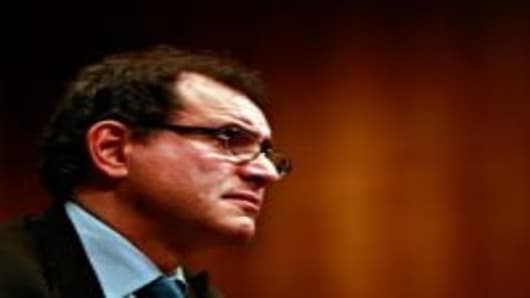It’s become an annual ritual at the Milken Institute Global Conference: Nouriel Roubini faces off with Michael Milken.
Milken is perpetually bullish on America, confident that our challenges can be overcome through innovation and market processes.
Roubini, well, he’s Doctor Doom.
The two met onstage Wednesday morning before a completely packed ballroom. Late-comers were turned away at the door. It was probably one of the most popular panels of the conference.
Roubini began with an uncharacteristic optimism, quickly rattling off a series of “upside risks” to the global economy: a global economic recovery, an asset price recovery, booming emerging markets, technological progress and ongoing globalization.
Then it was time for the bad news.
The global economy is threatened by the potential for a war with Iran, troubles in the broader Middle East, the possibility of a “slow motion trainwreck” in Europe, and a renewed economic slowdown in Europe. He had a fifth problem, something to do with China, but the debate with Milken that followed didn’t leave enough time for it.
Let's just focus on the Iran and Middle East trouble, which is what Roubini led with.
“There’s still a risk that there will be a military confrontation between Israel, and the US, and Iran,” Roubini said.
He sees the risk of a military conflict greatest after the U.S. presidential election, regardless of who wins. Negotiations to contain Iran’s nuclear ambitions have already failed, he argued.
Which means there is a “meaningful chance” the U.S. will “do the job” after the election, according to Roubini.
Even if a military confrontation doesn’t develop, we could see an oil price spike due to a fear premium, Roubini argued.
“If the war of words escalates, you get a fear premium,” he said.
Roubini, who speaks with almost machine-gun-like rapidity, went on to explain that he doesn’t think Iran is the only threat in the Middle East. The Arab spring could become an “Arab winter.”
“The wider Middle East is a total mess and so is a geopoloitical risk for the entire world economy,” he said.
Troubles in countries from Tunisia to Afghanistan could cause a “massive shock in oil prices.”
Milken responded to this by pointing out that a combination of improved technology and policy could alleviate these risks, by making the U.S. less dependent on Middle Eastern oil. Shale deposits, in particular, have the potential to allow countries like the U.S. and Brazil to become the greatest “low-cost suppliers” of energy around the world.
Roubini responded that shale might be a long-term solution but wouldn’t allow us to escape the short-term challenges of oil dependency.
“People who believe that in five years we’re going to be energy-independent are deluding themselves. It’s going to be a 10- to 20-year story,” he said.
This lead to a glimmer of agreement. Milken and Roubini both believe that eventually the world will move away from dependence on Middle Eastern oil—it’s just a matter of timing.
But Roubini warned that timing could be everything.
"Keynes used to say that in the long run we're all dead. We may be dead in the short run," he said.



